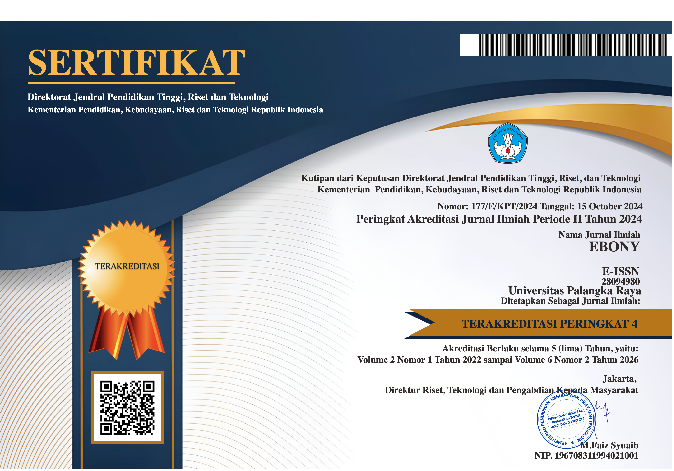Indonesian EFL Teachers’ Challenges: Integrating ICT in EFL Teaching
DOI:
https://doi.org/10.37304/ebony.v5i2.18789Keywords:
teacher challenges, ICT, EFL Teaching, non-web-based learningAbstract
The influence of ICT in language teaching has become a new, exciting, and demanding area to explore. Moreover, concerning teachers' role as facilitators, it is necessary to explore how they perceive ICT use in language teaching and to describe the challenges they have been experiencing during its implementation. This qualitative study explored the integration and challenges of using ICT in EFL teaching. The participants of this study were six Indonesian EFL teachers from Central Kalimantan Province, and they were interviewed to gain information. The data from semi-structured interviews were thematically analyzed. The results of this qualitative study indicated that the teachers have integrated technological tools into their teaching activities in terms of web-based and non-web-based learning. Laptops and mobile phones were the most prominent technological tools used by the teachers in the classroom. Those technologies are purposively used in teaching EFL skills and evaluation. However, the implementation is challenging, as the teachers argued that they needed more professional training in dealing with technical issues, limited technological tools, internet network issues, and the digital divide. The outcomes strengthen the comprehension of the implementation of technologies in EFL learning and trigger advanced investigation about educational technology influence in the EFL education realm.
Downloads
References
Abbood, H. M., & Dakhil, T. A. (2021). Iraqi EFL Teachers’ and Learners’ Attitude toward the Use of Technological Tools in EFL Class Room. Multicultural Education, 7(3), 136–149. https://doi.org/10.5281/zenodo.4618393
Ahmed, S. T. S., Qasem, B. T. A., & Pawar, S. V. (2020). Computer-assisted language instruction in South Yemeni context: A study of teachers’ attitudes, ICT uses and challenges. International Journal of Language Education, 4(1), 59–73. https://doi.org/10.26858/ijole.v4i2.10106
Al-Kadi, A. (2018). A Review of Technology Integration in ELT: From CALL to Mall. Language Teaching and Educational Research, 1(1), 1–12. https://eric.ed.gov/?id=ED588828
Al-Maini, Y. H. (2008). Issues in integrating information technology in learning and teaching EFL in Saudi Arabia. Learning, Media and Technology, 33(1), 72–76. https://doi.org/10.4995/eurocall.2013.9790
Al Arif, T. Z. Z., Armiwati, A., & Handayani, R. (2023). The Use of ICT for English Language Learning: A Mixed-Method Study of EFL University Students. IJELTAL (Indonesian Journal of English Language Teaching and Applied Linguistics), 8(2), 199. https://doi.org/10.21093/ijeltal.v8i2.1554
Albirini, A. (2006). Teachers’ attitudes toward information and communication technologies: the case of Syrian EFL teachers. Computers and Education, 47(4), 373–398. https://doi.org/10.1016/j.compedu.2004.10.013
Alghasab, M. B., Alfadley, A., & Aladwani, A. M. (2020). Factors Affecting Technology Integration in EFL Classrooms: The Case of Kuwaiti Government Primary Schools. Journal of Education and Learning, 9(4), 10. https://doi.org/10.5539/jel.v9n4p10
Alharbi, W. (2023). AI in the Foreign Language Classroom: A Pedagogical Overview of Automated Writing Assistance Tools. Education Research International, 2023. https://doi.org/10.1155/2023/4253331
Alkamel, M. A. A., & Chouthaiwale, S. S. (2018). The Use of Ict Tools in English Language Teaching and Learning:a Literature Review. Journal of English Language and Literature (JOELL), 5(2), 29–33. https://joell.in/wp-content/uploads/2018/04/29-33-THE-USE-OF-ICT-TOOLS-IN-ENGLISH-LANGUAGE.pdf
Aminullah, A., Loeneto, B. A., & Vianty, M. (2019). Teachers’ Attitudes and Problems of Using ICT in Teaching EFL. Journal of English Education, 8(1), 147–156. https://doi.org/10.25134/erjee.v8i1.2324
Ammade, S., Mahmud, M., Jabu, B., & Tahmir, S. (2018). Integrating Technology in English Language Teaching: Global Experiences and Lessons for Indonesia. International Journal of English Linguistics, 8(6), 107. https://doi.org/10.5539/ijel.v8n6p107
Andrei, E. (2017). Technology in Teaching English Language Learners: The Case of Three Middle School Teachers. TESOL Journal, 8(2), 409–431. https://doi.org/10.1002/tesj.280
Bannus, D. A., & Emeral. (2023). Indonesian University Students’ Attitudes and Aspirations Towards ICT in EFL Learning. EBONY: Journal of English Language Teaching, Linguistics, and Literature, 3(1), 53–70. https://doi.org/10.37304/ebony.v3i1.7997
Barrot, J. S. (2023). Using ChatGPT for second language writing: Pitfalls and potentials. Assessing Writing, 57(March), 100745. https://doi.org/10.1016/j.asw.2023.100745
Boonmoh, A., Jumpakate, T., & Karpklon, S. (2021). Teachers’ perceptions and experience in using technology for the classroom. Call-Ej, 22(1), 1–24. https://callej.org/index.php/journal/article/view/320
Boonmoh, A., Jumpakate, T., & Karpklon, S. (2022). A Close Look at the Use of Technology by Thai Teachers in Secondary EFL Classrooms. Call-Ej, 23(1), 78–107. https://callej.org/index.php/journal/article/view/372
Chaaban, Y., & Ellili-Cherif, M. (2017). Technology integration in EFL classrooms: A study of Qatari independent schools. Education and Information Technologies, 22(5), 2433–2454. https://doi.org/10.1007/s10639-016-9552-3
Champa, R. A., Rochsantiningsih, D., & Kristiana, D. (2019). Teachers’ challenges to integrate ICT in EFL teaching and learning activities. 3rd English Language and Literature International Conference (ELLiC), 3, 135–145. https://jurnal.unimus.ac.id/index.php/ELLIC/article/view/4719
Faoziah, O., Jubaedah, I. S., & Syarifah, E. F. (2019). The Use of ICT N EFL Classroom. Journal of English Language Learning (JELL), 3(No.1), 16–24. https://core.ac.uk/download/pdf/228884967.pdf
Irdianto, W., Lazareva, I. N., & Yaniafari, R. P. (2023). The Challenge of EFL Teachers in Technology-Integrated Learning in the Society 5.0 (Vol. 1). Atlantis Press SARL. https://doi.org/10.2991/978-2-38476-054-1_64
Ismaili, A. A. (2021). ICT Use in the EFL Classroom in Morocco. International Journal of Information and Communication Technology Education, 18(1), 1–13. https://doi.org/10.4018/ijicte.286759
Isnani, K., & Widyantoro, A. (2020). An Analysis of Teachers’ Attitude and Teaching Practice toward ICT Use in English Language Teaching Khoirunnisa. Proceedings of the 2nd International Conference on Education, ICE 2019, 27-28 September 2019, Universitas Muhammadiyah Purworejo, Indonesia, 12, 49–62. https://doi.org/http://dx.doi.org/10.4108/eai.28-9-2019.2291002
Kara, A. (2009). The effect of a “learning theories” unit on students’ attitudes toward learning. Australian Journal of Teacher Education, 34(3), 100–113. https://doi.org/10.14221/ajte.2009v34n3.5
Kozikoğlu, İ., & Babacan, N. (2019). The investigation of the relationship between Turkish EFL teachers’ technological pedagogical content knowledge skills and attitudes towards technology. Journal of Language and Linguistic Studies, 15(1), 20–33. https://doi.org/10.17263/jlls.547594
Makhlouf, K., & Bensafi, Z. (2021). An Exploration of Factors Influencing Teachers’ Attitudes toward the Use of Information and Communication Technology (ICT) in Classroom Practice A Case Study of Secondary School EFL Teachers in the Western District of Chlef , Algeria. Advances in Language and Literary Studies, 12(2), 37. https://doi.org/10.7575/aiac.alls.v.12n.2.p.37
Mweshi, G. K., & Sakyi, K. (2020). Application of sampling methods for the research design. Archives of Business Research, 8(11), 180–193. https://doi.org/10.14738/abr.811.9042
Nair, G. K. S., Rahim, R. A., Setia, R., Adam, A. F. binti M., Husin, N., Sabapathy, E., Mohamad, R., So’od, S. M. M., Md Yusoff, N. I., Mohd Razlan, R., Abd Jalil, N. A., Ariffin, E. F. N. H., & Seman, N. A. (2012). ICT and teachers’ attitude in English language teaching. Asian Social Science, 8(11), 8–12. https://doi.org/10.5539/ass.v8n11p8
Nazara, S. (2019). Proceeding EFL Theory & Practice Voice of EED UKI. English Education Departement Collegiate Frofum (EED CF), January 2019, 126–135. http://repository.uki.ac.id/925/
Nguyen, T. T. H. (2023). EFL Teachers’ Perspectives toward the Use of ChatGPT in Writing Classes: A Case Study at Van Lang University. International Journal of Language Instruction, 1(1), 143–154. https://doi.org/https://doi.org/10.54855/ijli.23231
Nurhidayat, E., Mujiyanto, J., Yuliasri, I., & Hartono, R. (2024). Technology integration and teachers’ competency in the development of 21st-century learning in EFL classroom. Journal of Education and Learning, 18(2), 342–349. https://doi.org/10.11591/edulearn.v18i2.21069
Önalan, O., & Kurt, G. (2020). Exploring Turkish EFL teachers’ perceptions of the factors affecting technology integration: A case study. Journal of Language and Linguistic Studies, 16(2), 626–646. https://doi.org/10.17263/JLLS.759264
Pratolo, B. W., & Solikhati, H. A. (2020). Investigating teachers’ attitude toward digital literacy in EFL classroom. Journal of Education and Learning (EduLearn), 15(1), 97–103. https://doi.org/10.11591/edulearn.v15i1.15747
Purwati, D., Fathirma’ruf, F., Lakehu, A., & Taufik, T. (2024). Investigating Indonesian EFL preservice teachers’ digital technological awareness and their challenges in EFL learning: A case study. Journal on English as a Foreign Language, 14(1), 152–178. https://doi.org/10.23971/jefl.v14i1.7625
Rahimi, M., & Yadollahi, S. (2011). ICT Use in EFL Classes: A Focus on EFL Teachers’ Characteristics. World Journal of English Language, 1(2), 17–29. https://doi.org/10.5430/wjel.v1n2p17
Raygan, A., & Moradkhani, S. (2022). Factors influencing technology integration in an EFL context: investigating EFL teachers’ attitudes, TPACK level, and educational climate. Computer Assisted Language Learning, 35(8), 1789–1810. https://doi.org/10.1080/09588221.2020.1839106
Singh, R. (2019). Barriers of technology integration in teaching English. 24–37. https://doi.org/10.5281/zenodo.3364752
Tenny, S., Brannan, J. M., & Brannan, G. D. (2023). Qualitative Study. StatPearls Publishing, Treasure Island (FL). http://europepmc.org/books/NBK470395
Thompson, J. (2022). A Guide to Abductive Thematic Analysis. Qualitative Report, 27(5), 1410–1421. https://doi.org/10.46743/2160-3715/2022.5340
Tran, M. T., Pham, N. T., & Dinh, T. B. H. (2023). Teachers’ Attitudes towards the Use of Information and Communication Technology in Teaching English: Impacts of Teachers’ Characteristics. AsiaCALL Online Journal, 14(1), 61–84. https://doi.org/https://doi.org/10.54855/acoj.231415
Vall, R. R. F. de la, & Araya, F. G. (2023). Exploring the Benefits and Challenges of AI-Language Learning Tools. International Journal of Social Sciences and Humanities Invention, 10(01), 7569–7576. https://doi.org/10.18535/ijsshi/v10i01.02
Vuong, T. H. (2024). Teachers’ attitudes towards information communication technology use in EFL teaching at primary schools in Vietnam – A pilot study. Working Papers in Language Pedagogy, 18(2005). https://doi.org/10.61425/wplp.2023.18.56.79
Williyan, A., & Sirniawati, . (2020). Ict in Distance Learning: Teachers’ Attitudes and Problems. ELT Echo : The Journal of English Language Teaching in Foreign Language Context, 5(2), 119. https://doi.org/10.24235/eltecho.v5i2.6949
Downloads
Published
How to Cite
Issue
Section
License
Copyright (c) 2025 Dedy Arianto Bannus, Emeral Emeral

This work is licensed under a Creative Commons Attribution 4.0 International License.











